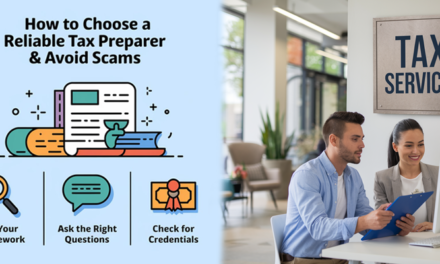Receiving a letter from the IRS can be a nerve-wracking experience, often bringing a mix of dread, confusion, and concern. However, it’s important to remember that not all IRS notices are bad news. Many are routine communications related to your tax return, and understanding these notices can significantly reduce the stress involved. Familiarizing yourself with the most common IRS notices and knowing how to respond can help you navigate the process more smoothly and efficiently.
Understanding the IRS Notice System
The IRS uses a structured system of notices to communicate with taxpayers. Each notice typically contains a unique code, providing insight into its purpose. While the IRS sends out a wide variety of notices, this guide will focus on the ten most frequently encountered ones. Recognizing these notices and understanding their implications can help you manage your tax obligations with greater ease.
The Top 10 IRS Notices
1. CP14: Balance Due – No Math Error
The CP14 notice is one of the most common IRS communications. It indicates that you owe additional taxes. This notice is sent when the IRS has reviewed your tax return and determined that you may have claimed deductions or credits that were not allowed. The notice will detail the amount due and provide instructions on how to make the payment.
It’s important to address this notice promptly to avoid further penalties or interest.
2. CP11: Changes to Your Tax Return – Balance Due
Similar to the CP14, the CP11 notice signifies that the IRS has made changes to your tax return, resulting in a balance due. However, the changes referenced in a CP11 are typically due to adjustments the IRS made that are different from those in a CP14. This might involve corrections to your reported income, deductions, or credits.
As with the CP14, timely payment is crucial to avoid additional charges.
3. CP501: Balance Due Reminder
The CP501 notice is a reminder from the IRS that you still owe taxes. It’s generally the first follow-up notice after an initial balance due communication like the CP14. This notice is less urgent than others, serving as a gentle nudge to encourage you to pay the outstanding balance.
Ignoring this notice can lead to more severe actions by the IRS, so it’s advisable to address it as soon as possible.
4. CP503: Urgent Notice – Balance Due
The CP503 notice is more serious than the CP501, indicating that the IRS has not received payment for your outstanding balance. This notice warns of potential collection actions if the debt is not resolved promptly.
It’s a clear indication that the IRS is stepping up its efforts to collect the owed taxes, and immediate action should be taken to either pay the balance or contact the IRS to discuss payment options.
5. CP12: Changes to Your Tax Return – Overpayment
Unlike the previous notices, the CP12 notice often brings good news. This notice informs you that the IRS has recalculated your tax return and determined that you’re eligible for a larger refund than originally reported. This might happen if there was a miscalculation in your favor.
The notice will provide details on the adjusted refund amount and when you can expect to receive it.
6. CP49: Overpayment Applied to Unpaid Balance
If you receive a CP49 notice, it means that while you’re entitled to a refund, the IRS has applied part or all of it to a previous tax debt. This notice will detail how much of your refund was used to offset the outstanding balance.
If you have no outstanding tax debts, but receive this notice, you should contact the IRS to ensure there hasn’t been a mistake.
7. CP2000: Notice of Underreported Income
The CP2000 notice is sent when the IRS has information suggesting you may have underreported your income. This notice typically arrives if the income reported on your tax return doesn’t match the information the IRS received from third-party sources, such as employers or financial institutions.
The CP2000 notice isn’t an audit, but it can lead to one if not addressed. The notice will provide details on the discrepancy and how to respond.
8. CP161: Balance Due – Request for Payment
The CP161 notice is a demand for immediate payment of your outstanding tax balance. Unlike the CP501 or CP503, which are reminders or warnings, the CP161 is more direct, indicating that the IRS expects payment promptly.
Failing to respond to this notice can result in more aggressive collection actions, so it’s important to resolve the balance as soon as possible.
9. CP90/CP297: Final Notice Before Levy
The CP90 and CP297 notices are some of the most serious communications you can receive from the IRS. These notices warn that the IRS intends to levy your property, such as bank accounts or wages, if you don’t pay your taxes or establish a payment plan. Receiving this notice means the IRS is preparing to take drastic measures to collect the debt.
Immediate action is required to either pay the debt or contact the IRS to discuss alternatives.
10. CP10: Changes to Your Tax Return – Reduced Amount Applied to Estimated Tax
The CP10 notice informs you that the IRS has adjusted your estimated tax payment for the upcoming year due to changes made to your current year’s return. This might happen if the IRS made corrections to your return that affect your estimated tax obligations.
The notice will explain the changes and how they impact your future estimated tax payments.
How to Respond to an IRS Notice
Receiving an IRS notice can be overwhelming but staying calm and organized is essential. Here’s a general approach to managing IRS notices:
- Read Carefully: Take the time to thoroughly review the notice to understand why the IRS is contacting you. Each notice will include a detailed explanation of the issue and what steps you need to take.
- Verify Information: Ensure that the information on the notice is accurate. Compare it with your tax return and other financial records. If you believe there’s a mistake, gather documentation to support your case.
- Respond Promptly: Adhere to the instructions outlined in the notice. If a response or payment is required, do so within the timeframe specified to avoid further penalties.
- Seek Professional Help: If you’re unsure how to proceed or the situation is complex, consult a tax professional. A CPA or tax attorney can provide guidance and help you navigate any disputes with the IRS.
Additional Tips for Managing IRS Notices
- Keep Copies: Maintain copies of all IRS correspondence and any related documents. This will be helpful if you need to reference them in the future.
- Set Up an Online Account: Consider setting up an online IRS account for easy access to your tax information. This can streamline the process of managing your tax obligations.
- Explore Payment Plans: If you can’t pay your taxes in full, explore payment plan options. The IRS offers several payment plans that can help you manage your debt more effectively.
- Beware of Scams: Be cautious of unsolicited calls or emails claiming to be from the IRS. The IRS typically communicates via mail and rarely makes phone calls. If you’re unsure about the legitimacy of a notice, contact the IRS directly.
Conclusion
Understanding common IRS notices is crucial for effective tax management. By familiarizing yourself with these communications, you can take proactive steps to address any issues and minimize potential penalties. Remember, receiving an IRS notice isn’t always bad news—sometimes, it’s simply a routine part of managing your tax obligations. By staying informed and responding appropriately, you can navigate the IRS notice system with confidence.





